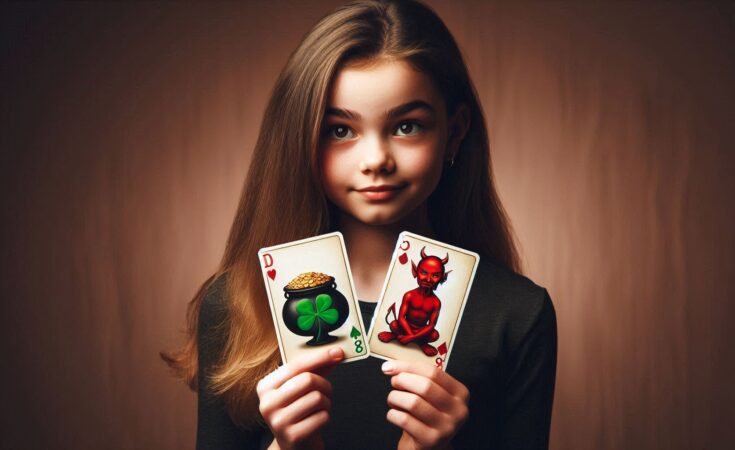Life has a curious way of surprising us. Sometimes, what seems like a gift can later prove to be a challenge, and what feels like a disappointment may, in hindsight, be the very thing that sets us on a better path. As parents, one of the most valuable lessons we can impart to our children is that the universe often works in mysterious ways, guiding us toward growth, even when we don’t immediately understand how.
Years ago, before I even met my husband, I crossed paths with a very charming man. He was well-known in the arts community—and not just for his work. His reputation as a ladies’ man extended far beyond the stage and screen. As a single woman at the time, I found myself the target of his relentless flirtation. He was, admittedly, delightful company, and his fame made all my friends envious of the fact that I could laugh and occasionally dine with such a renowned figure.
And yet, something in my gut told me to run. It was like an intuition whispering in the back of my mind. Eventually, I decided to show my true self—honestly and openly. I revealed to him that I was in a phase of transition: an artist and journalist on the brink of becoming a therapist. I spoke candidly about my ambitions. That’s when his demeanor shifted. He began to look down on me, his charm replaced with condescension. He didn’t like ambitious women. He needed to dominate everyone and everything around him.
After that meeting, where I had been authentically myself, he decided not to see me again, dismissing me as a “complicated girl.” I was disappointed, but at the same time, I had plenty to focus on: recording my music, writing my books, getting back into shape, expanding my consciousness, and traveling as I pleased—a full and exciting agenda.
Three years later, I had just met my husband when this man returned, as bold as ever. He attempted to rekindle a connection, but I gently put him in his place, wishing him more emotional stability. When he expressed interest in seeing me again but refused to meet my husband, I cut ties completely—even as a friend.
A few years later, my husband, children, and I were blissfully moving into a new home in a spa town—a beautiful, large pink house—when we learned from the news of his death. He had taken his own life. It turned out he had played so many games with people that he lost his standing in the arts world, which had been the cornerstone of his identity. On top of that, we discovered he had grossly mismanaged his finances, chasing a luxurious, star-like lifestyle without ever truly achieving the recognition to sustain it.
That day, I thought to myself, “Thank God I wasn’t allowed to get involved with him!” My decision to walk away had been a true blessing, even if it didn’t feel like it at the time.
Children naturally crave what feels good and avoid what feels bad—it’s human nature. But helping them see beyond the immediate experience is a key step in their emotional and spiritual development. For instance, missing out on making the soccer team might feel like a failure at first, but it could open doors to discovering a passion for music or art. Conversely, winning an award may lead to pressure or expectations that feel overwhelming. Both success and failure carry lessons, and both are tools for growth.
In high school, we were all in love with this guy: green eyes, bowl cut, preppy style, and wearing Weston loafers (haha). Years later, when I catch up with the friends I’ve kept from that time, we laugh and joke, “Thank goodness none of us married that guy!”
Why? By the age of 25, he had doubled in size and lost his once-gorgeous blonde hair. Years of alcohol, cigarettes, and indulgent business dinners had taken their toll.
Yet again, what once seemed like a curse turned out to be a blessing in disguise!
Teaching this perspective helps kids build resilience. Explain to them that life’s events, whether they seem “good” or “bad” at first glance, are all part of a larger picture—a universe designed to help them thrive. Encourage them to ask, “What can I learn from this?” instead of simply labeling experiences as successes or setbacks.
Here’s another flashback: failing my first year of university completely changed my life. I was 19, and until then, I had never failed at anything. I had sailed effortlessly from one grade to the next. But this time, I hadn’t put in much effort—too caught up in frivolous outings—and the result was clear.
The following year, I enrolled in a competitive communications program with a national success rate of just 12%! I worked hard, excelled over two years, and graduated with flying colors. Afterward, I returned to university, and this time, over three years, I became the top student in my section.
That failed first year, which seemed like a curse at the time, was actually a blessing in disguise. It opened my eyes to my potential and showed me what I was truly capable of achieving!
By reframing challenges as opportunities, we empower our children to trust the process of life. They’ll learn to see both blessings and struggles as valuable, knowing that the universe ultimately has their best interests at heart. Sometimes, not getting what you want is the greatest gift of all.


































